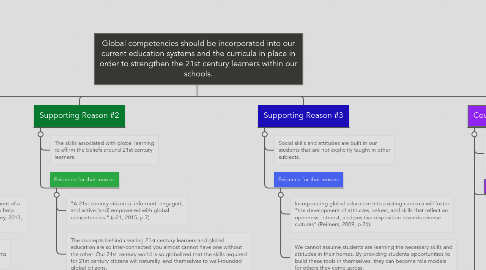
1. Supporting Reason #1
1.1. Global competency will allow for well-rounded global citizens to enter the world following their school experience.
1.2. Evidence for that reason:
1.2.1. It is a widespread belief that “the development of a student’s global competence is necessary to help them navigate the world around them” (Wiley, 2013, p.vii).
1.2.2. Our world is continuing to grow in its connectedness; we must prepare our students as best as possible for this.
2. Supporting Reason #2
2.1. The skills associated with global learning re-affirm the beliefs around 21st century learners.
2.2. Evidence for that reason:
2.2.1. "A 21st century citizen is: informed, engaged, and active [and] empowered with global competencies." (p21, 2015, p.7)
2.2.2. The concepts behind creating 21st century learners and global education are so inter-connected you almost cannot have one without the other. Our 21st century world is so globalized that the skills required for 21st century citizens will naturally lend themselves to well-rounded global citizens.
3. Supporting Reason #3
3.1. Social skills and attitudes are built in our students that are not explicitly taught in other subjects.
3.2. Evidence for that reason:
3.2.1. Incorporating global education into existing curricula will foster "the development of attitudes, values, and skills that reflect an openness, interest, and positive disposition towards diverse cultures” (Reimers, 2009, p.26).
3.2.2. We cannot assume students are learning the necessary skills and attitudes in their homes. By providing students opportunities to build these tools in themselves, they can become role models for others they come across.
4. Counter position
4.1. Global education and globally connected learning will only benefit those who have the technology and resources necessary to continue strengthening their global citizenship following their time in school.
4.2. Evidence for that position:
4.2.1. The Partnership for 21st Century Skills explains that "a tightly connected, digital world empowers people to access unlimited information, join communities around shared purposes, contribute creative ideas to solve problems, and amplify their voices and impact" (p21, 2015, p.6).
4.2.2. If students do not have or are not provided with the resources needed to reach the digital world, the skills related to 21st century learners are irrelevant.
4.3. Rebuttal
4.3.1. Digital citizenship is but one aspect of global competencies and global education; if students are not readily provided technology and digital resources other aspects of global education can be taught to them instead. For instance, technology is not needed to foster attitudes of acceptance and empathy in students.
